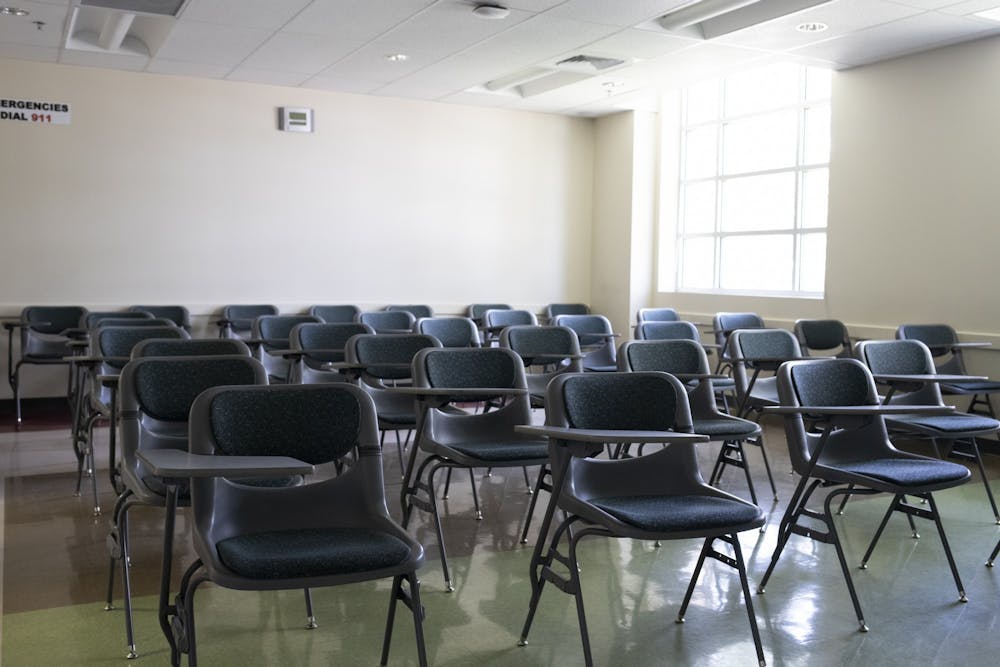This upcoming semester, all undergraduate students have the opportunity to take Intro to Asian American Studies — a class that is being offered for the second time.
Shinsuke Eguchi, a professor in the communication department, will teach the class this fall. The course is about “understanding the historical, political, and economic context in which Asian Americans are racialized,” they said.
Asian American studies is a discipline that is growing across the country, according to Shebati Sengupta, a graduate student studying Asian American Studies, who designed and taught the first rendition of the course. She said this class covers what she would have wanted to learn about in an intro course, as Asian American issues are often left out of other experiences.
“It was important to me to really emphasize the political roots of the term ‘Asian Americans’ that emerged from organizing in the ‘60s and ‘70s. And that's where the course starts,” Sengupta said.
Advocates in several states have pushed for legislation to require the inclusion of Asian American history in curriculums, in response to the recent rise in anti-Asian hate, according to Education Week.
“This is the kind of class you take away (information) with you regardless of what field you go into,” Sengupta said. “It helps you understand the way you move through the world — the way other people move through the world.”
Despite pasts attempts to create this course, it is the first of its kind to be offered at the University, Eguchi said. However, the class is currently a topics course and isn’t offered every semester. Sengupta said that she hopes with the transfer of the course to tenured professor, Eguchi, it could secure a more permanent status in the future.
“I would love to see it shift into a class that fulfills the requirements of the university, and I would love to see it become a core class, maybe a minor, major or a special program that people can take in Asian American Studies,” Sengupta said.
This course will teach about the diversity of Asian American experiences, and counter the model minority myth that depicts Asian Americans as the fruition of the American dream, Eguchi said.
“Asian Americans are always situated as if they are aligning with the white community all the time because of the model minority myth, but in reality they are Asian American activists who are always aligning with people of color, or feminist (movements) to fight against this oppression,” Eguchi said.
Asian American experiences in New Mexico are something both Eguchi and Sengupta often said are forgotten because of the tricultural myth in the state that claims white, Latinx and Native Americans live in harmony.
“I think particularly on this campus, issues around Blackness and also Asianness can be forgotten, or ignored or marginalized due to this triangulation of white, Hispanic and Native American: Happy New Mexico. Which is very historically important, but it doesn't mean that there is no connection to Asian Americans,” Eguchi said.
Get content from The Daily Lobo delivered to your inbox
Asian American history does exist in the state and it is important to discuss, Sengupta said.
“There's a ton of Asian American migrants here. There were multiple Japanese internment camps here, so New Mexico has this really strong history, Sengupta said. Asian Americans used to move to New Mexico because it was one of the only states that allowed intermarriage."
How identities intersect is another key aspect of the course, Eguchi said. When teaching, they plan to emphasize which perspectives are not included, or how other identities might connect.
“We need to always think about this invisible intersection that is happening in each reading that we're going to read, so I'm going to definitely emphasize on what has not been said,” Eguchi said.
In light of bans on ethnic studies programs in states like Florida, courses like Asian American studies are important for present and future students, Sengupta said.
“Learning how to take care of yourself while moving through the world, and taking care of others and building community is so important,” Sengupta said. “We're seeing, right now, a lot of pushback against inclusive education, and this is a great way, just by showing up, to show that you care about that.”
Maddie Pukite is the editor-in-chief at the Daily Lobo. They can be contacted at editorinchief@dailylobo.com or on Twitter @maddogpukite






